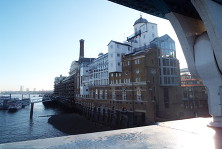
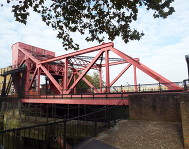
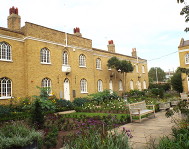
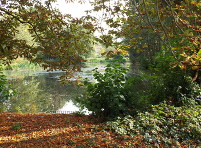

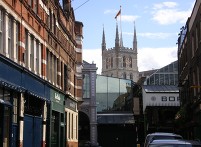



The Mayflower
The Mayflower public house in Rotherhithe is named after one of the most famous sailing ships in history which in 1620 took a band of men and women of religious conscience, the Pilgrim Fathers, to a new life in the New World. Here they would be able to worship and express their religious views freely. The majority of passengers joined the ship at Southampton but the ship was berthed at Rotherhithe before its trip to Southampton and at least two of its four owners, including the captain Christopher Jones, were Rotherhithe residents. Rotherhithe had long been a centre for ship-building and sea faring. Henry VIII had kept some ships there and in 1612 a charter was granted to shipwrights, caulkers, ship carpenters and those who exercised any trade in the making of ships under the name of 'the master, wardens and commonalty of the art or mystery of the shipwrights of Redrith [Rotherhithe] in Surrey.'
Though born in Harwich where he is still celebrated, by 1611 Christopher Jones was living in Rotherhithe, clearly an advantageous place for a ship’s captain to live for securing business from merchants in London seeking ships to import and export goods. He had four children who were baptised in St Mary’s Church, Rotherhithe and is himself buried in St Mary’s Churchyard. Where the Mayflower was built is less certain, with Harwich, Aldeburgh and Leigh-on-Sea as contenders.
The voyage was financed by a group of investors, the London Merchant Adventurers, led by ironmonger Thomas Weston and it is thought they invested about £7000. The deal was the Adventurers would invest money and the colonists their labour for a seven year period during which time all land, livestock, and trading commodities such as timber and furs were owned in partnership. Thomas Weston also recruited other passengers for the voyage, “strangers”, those not motivated by a desire to practice their religion in freedom but by a desire to create a better life.
The Mayflower embarked on the voyage from Southampton on 5 August 1620 with its sister ship the Speedwell. The Speedwell developed a leak 300 miles out to sea and both ships returned to Plymouth. After six weeks, the Speedwell was abandoned and the passengers transferred to the Mayflower, the ship finally setting sail on 6 September 1620. The Mayflower is said not to have been in good condition and the voyage was cramped, cold, wet and and must have been frightening. A landing was made at Cape Cod on 21st December and the colony named Plymouth. Within a few months, before proper shelter could be built, half the party had died from scurvy, pneumonia and tuberculosis.
Captain Jones and his surviving crew returned to Rotherhithe on the Mayflower in May 1621 and Thomas Weston and the London Merchant Adventurers were dismayed there was no cargo on board. The voyage had taken its toll on Captain Jones and a year later he was dead. He is buried in St Mary’s Churchyard but the exact location of his grave is not known as due to damage caused by flooding the church and graveyard were rebuilt in 1715. A powerful sculpture by Jamie Sergeant was installed in the churchyard in 1995 to commemorate Captain Christopher Jones commissioned by The National Society of Sons and Daughters of the Pilgrims. It takes the form of St Christopher carrying a Christ child standing on a plinth shaped like a ship.
The pub called The Mayflower has only been going by this name since 1958 after rebuilding necessitated by bomb damage in World War II. In previous incarnations it has gone by the name of the Spread Eagle and the Spread Eagle and Crown, and while it may not be on the exact spot from where the Mayflower set sail it, the point of departure cannot be far away. The pub is very atmospheric and definitely worth a visit with good views of the river from the jetty at the rear. It is only a few years now before the 400th anniversary of the voyage and the landing of the Pilgrim Fathers will be celebrated. Plans are already underway, one suggestion is for the construction of a new pier in Rotherhithe to facilitate a new commuter service on the river.
Web discoveries
- UK Casino Not On Gamstop
- UK Casino Not On Gamstop
- Non Gamstop Casino
- Casinos Not On Gamstop
- Non Gamstop Casinos
- Non Gamstop Casinos
- Non Gamstop Casino
- Casinos Not On Gamstop
- Casino Sites Not On Gamstop
- Slots Not On Gamstop
- Casinos Not On Gamstop
- UK Betting Sites Not On Gamstop
- UK Casino Not On Gamstop
- Best Non Gamstop Casinos
- Betting Sites
- Non Gamstop Casino Sites UK
- Best Non Gamstop Casinos
- Non Gamstop Casino
- Casinos Not On Gamstop
- Non Gamstop Casino Sites UK
- Horse Racing Betting